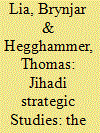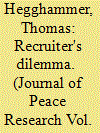|
|
|
Sort Order |
|
|
|
Items / Page
|
|
|
|
|
|
|
| Srl | Item |
| 1 |
ID:
068373


|
|
|
| 2 |
ID:
083074


|
|
|
|
|
| Publication |
2008.
|
| Summary/Abstract |
Saudi Arabia, homeland of Osama bin Laden and 15 of the 19 hijackers of September 11, 2001, experienced low levels of internal violence until 2003, when a terrorist campaign by 'Al-Qaeda on the Arabian Peninsula' (QAP) shook the world's leading oil producer. Based on primary sources and extensive fieldwork in the Kingdom, this article traces the history of the Saudi jihadist movement and explains the outbreak and failure of the QAP campaign. It argues that jihadism in Saudi Arabia differs from jihadism in the Arab republics in being driven primarily by extreme pan-Islamism and not socio-revolutionary ideology, and that this helps to explain its peculiar trajectory. The article identifies two subcurrents of Saudi jihadism, 'classical' and 'global', and demonstrates that Al-Qaeda's global jihadism enjoyed very little support until 1999, when a number of factors coincided to boost dramatically Al-Qaeda recruitment. The article argues that the violence in 2003 was not the result of structural political or economic strains inside the Kingdom, but rather organizational developments within Al-Qaeda, notably the strategic decision taken by bin Laden in early 2002 to open a new front in Saudi Arabia. The QAP campaign was made possible by the presence in 2002 of a critical mass of returnees from Afghanistan, a clever two-track strategy by Al-Qaeda, and systemic weaknesses in the Saudi security apparatus. The campaign failed because the militants, radicalized in Afghan camps, represented an alien element on the local Islamist scene and lacked popular support. The near-absence of violence in the Kingdom before 2003 was due to Al-Qaeda's weak infrastructure in the early 1990s and bin Laden's 1998 decision to suspend operations to preserve local networks. The Saudi regime is currently more stable and self-confident-and therefore less inclined to democratic reform-than it has been in many years
|
|
|
|
|
|
|
|
|
|
|
|
|
|
|
|
| 3 |
ID:
097556


|
|
|
|
|
| Publication |
Cambridge, Cambridge University Press, 2010.
|
| Description |
x, 290p.
|
| Series |
Cambridge Middle East studies; 33
|
| Standard Number |
9780521732369
|
|
|
|
|
|
|
|
|
|
|
|
Copies: C:1/I:0,R:0,Q:0
Circulation
| Accession# | Call# | Current Location | Status | Policy | Location |
| 055069 | 322.4209538/HEG 055069 | Main | On Shelf | General | |
|
|
|
|
| 4 |
ID:
054171


|
|
|
|
|
| Publication |
Sep-Oct 2004.
|
|
|
|
|
|
|
|
|
|
|
|
|
|
|
|
| 5 |
ID:
121786


|
|
|
|
|
| Publication |
2013.
|
| Summary/Abstract |
How do terrorists recruit? We know much about the profiles and pathways of recruits, but little about the strategies and tactics of recruiters. Such procedures matter because they help determine who joins. I highlight a key determinant of recruiter tactics, namely, the tension between personnel needs and infiltration risks. Drawing on signalling theory, I present an analytical framework that conceptualizes recruitment as a trust game between recruiter and recruit. I argue that the central logic shaping recruiter tactics is the search for cost-discriminating signs of trustworthiness. Due to the context-specificity of signal costs and the room for tactical innovation, optimal recruitment tactics vary in space and time, but the underlying logic is the same for most groups facing a high threat of infiltration. I apply the framework to an al-Qaeda recruitment campaign in early 2000s Saudi Arabia, where it helps explain tactical preferences (why recruiters favoured some recruitment arenas over others) and differential network activation (why recruiters preferred war veterans over radical candidates from other networks). The trust dilemma also accounts for unexpected recruiter choices, such as their reluctance to solicit on the Internet and in mosques, and their preference for recruits who knew poetry or wept during prayer. Thus the signalling framework does not challenge, but provides a useful micro-level complement to, existing theories of recruitment.
|
|
|
|
|
|
|
|
|
|
|
|
|
|
|
|
| 6 |
ID:
182243


|
|
|
|
|
| Summary/Abstract |
What,” I sometimes ask students in a class I teach on
the history of terrorism,
“was the name of the Islamic State’s
branch in Europe?”Itis a trick question: the Islamic State (also known as
ISIS) never set up a full-Èedged European branch.Thegroup’s self-proclaimed
caliph, Abu Bakr al-Baghdadi, knew
better than to try.By2014,when ISIS
formalized its split from al Qaeda and
established itself as the dominant
player in the global Sala¼-jihadi movement, Western security services had
¼gured out how to make it eectively
impossible for the group to establish a
base of operations in Europe or North
America. Like al Qaeda before it, ISIS
was only ever present in theWe s tin the
form of disparate cells and sympathizers.
|
|
|
|
|
|
|
|
|
|
|
|
|
|
|
|
| 7 |
ID:
101885


|
|
|
|
|
| Publication |
2011.
|
| Summary/Abstract |
Why has transnational war volunteering increased so dramatically in the Muslim world since 1980? Standard explanations, which emphasize U.S.-Saudi support for the 1980s Afghan mujahideen, the growth of Islamism, or the spread of Wahhabism are insufficient. The increase in transnational war volunteering is better explained as the product of a pan-Islamic identity movement that grew strong in the 1970s Arab world from elite competition among exiled Islamists in international Islamic organizations and Muslim regimes. Seeking political relevance and increased budgets, Hijaz-based international activists propagated an alarmist discourse about external threats to the Muslim nation and established a global network of Islamic charities. This "soft" pan-Islamic discourse and network enabled Arabs invested in the 1980s Afghanistan war to recruit fighters in the name of inter-Muslim solidarity. The Arab-Afghan mobilization in turn produced a foreign fighter movement that still exists today, as a phenomenon partly distinct from al-Qaida. The analysis relies on a new data set on foreign fighter mobilizations, rare sources in Arabic, and interviews with former activists.
|
|
|
|
|
|
|
|
|
|
|
|
|
|
|
|
| 8 |
ID:
121087


|
|
|
|
|
| Publication |
2013.
|
| Summary/Abstract |
This article studies variation in conflict theater choice by Western jihadists in an effort to understand their motivations. Some militants attack at home, whereas others join insurgencies abroad, but few scholars have asked why they make these different choices. Using open-source data, I estimate recruit supply for each theater, foreign fighter return rates, and returnee impact on domestic terrorist activity. The tentative data indicate that jihadists prefer foreign fighting, but a minority attacks at home after being radicalized, most often through foreign fighting or contact with a veteran. Most foreign fighters do not return for domestic operations, but those who do return are more effective operatives than nonveterans. The findings have implications for our understanding of the motivations of jihadists, for assessments of the terrorist threat posed by foreign fighters, and for counterterrorism policy.
|
|
|
|
|
|
|
|
|
|
|
|
|
|
|
|
| 9 |
ID:
076094


|
|
|
|
|
|
|
|